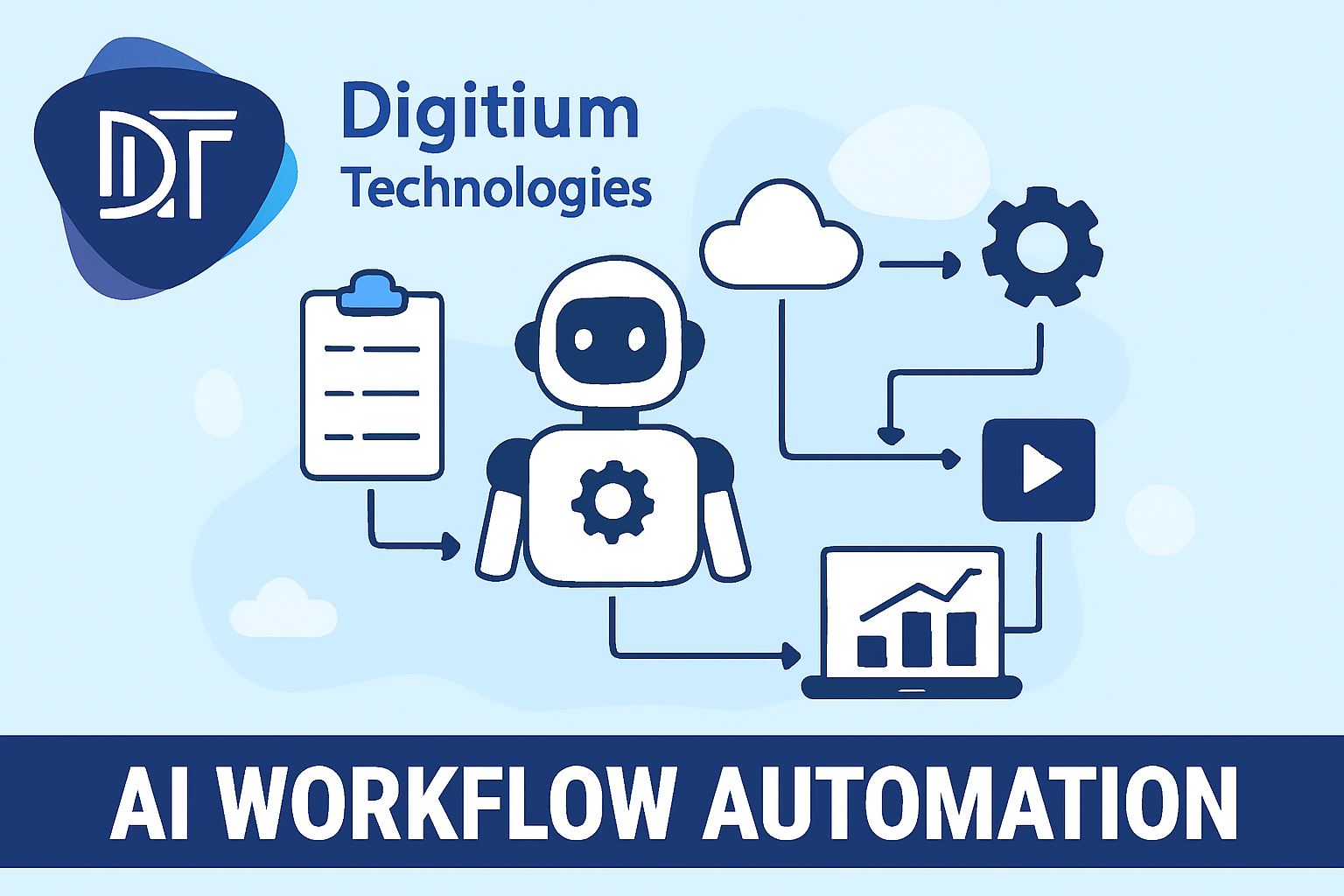Sep 25, 2025 • Digitium AI
How Does AI Workflow Automation Streamline Operations?

Let us understand in detail what AI Workflow Automation is exactly and how it makes operation easier.
What is AI Workflow Automation?
AI Workflow automation means automating any procedure i.e. to complete repeated tasks without human intervention through technology. This may include sending email, data entry, customer aid, reporting, or process of approval.
When artificial intelligence is added to it, this automation becomes even more smart. With the help of AI, machines can understand data, identify patterns, decide and mold themselves according to changing circumstances.
Major benefits of AI Workflow Automation in Operations
1. Increase in speed and productivity
Traditional work works takes more time and employees are often entangled in repeated work. AI automation completes such tasks in a few seconds.
For example, a company has to respond to the email of thousands of customers. AI Chatbot immediately replies and gives employees time to focus on large and complex tasks.
2. Reduction in errors
There is a possibility of mistakes in the work done by humans. Even a small mistake in data entry, reporting or invoice processing can cause a big problem. The AI -based system works on rules and patterns, making the possibility of mistakes negligible.
3. Savings in Cost
With the help of automation, companies do not need employees on a large scale. This reduces costs like salary and training. Also, operational expenses also decrease due to the work being fast and accurate.
4. Improves customer experience
Customer satisfaction is the backbone of any organization. AI Workflow Automation responds to customers immediately, solves their problems and provides personal services.
For example, automated updates of order status on e-commerce platforms provide better experience to customers.
5. Data based decisions
The biggest strength of AI is its data analysis. It can analyze the data on a large scale and remove patterns and insights. This helps the management make strategic decisions.
AI Workflow Automation Processes
1. Human Resource (HR) Processes
• Resume screening in recruitment process
• Presence of employees and payroll processing
• Employee grievance handling through chatbots
2. Finance and Accounting
• Invoice generation and payment tracking
• Automatic classification of expenses
• Identification of fraud
3. Customer Support
• 24x7 chatbot services
• Email and ticket management
• Personal suggestions and solutions
4. Marketing and Sales
• Lead generation and scoring
• Analysis of customer behavior
• Automation of email and social media campaign
5. IT and Operations
• Network monitoring
• Cyber security alert
• Auto-solution of technical problems
Examples of real life
Banking sector
By using AI based automation, banks are able to identify customers' KYC verification, loan approval and fraud very fast.
E-commerce
Platforms such as Amazon and Flipkart analyze customers browsing and shopping patterns individual suggestions.
Healthcare
AI Workflow Automation is being automated at the analysis of medical reports, appointment booking and reminding patients of medicine.
Challenges and precautions
Even though AI Workflow Automation gives many benefits, but there are some challenges with it:
• Job concern: Employees feel that automation will take away their jobs.
• Data privacy: There is a possibility of misuse of sensitive data.
• Initial investment: The initial cost is higher in implementing the AI system.
• Skill Gap: Employees require training to learn new technology.
Future possibilities
AI Workflow Automation is going to be further advanced in the coming times. In the future, it will not only automatically, but will also collaborate in predictive analysis and strategic decision making.
Also, the era of "Hyperautomation" is coming in which AI, machine learning, robotic process automation (RPA) and analytics will work together. This will make the trade operations even smoother and faster.
Conclusion
AI Workflow Automation has become a requirement not just a technical option for modern businesses. This makes the operation fast, accurate and cost effective. From improving customer experience to making data -based decisions, its benefits are countless.
Therefore, organizations that want to stay ahead in future competition should not delay in adopting AI Workflow Automation.